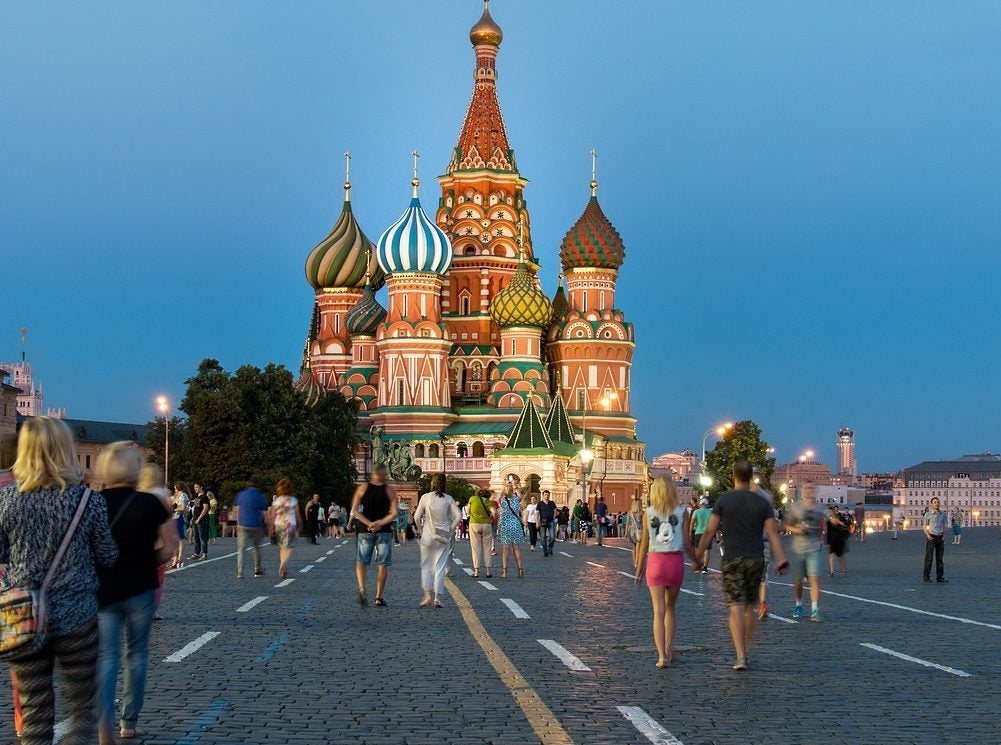
PepsiCo, Danone and Mars are among the food and drinks companies cited in a report critical of the continued western business presence in Russia.
In the latest of B4Ukraine’s regular updates on 4 July, in conjunction with data from the Kyiv School of Economics, the coalition group has flagged the top revenue-generating industries in Russia last year: alcohol and tobacco ($24.1bn), FMCG ($21.4bn), automotive ($19.6bn) and, in fourth, food and beverages ($18.4bn).

Discover B2B Marketing That Performs
Combine business intelligence and editorial excellence to reach engaged professionals across 36 leading media platforms.
The FMCG sector includes “major European brands Unilever, Danone and Nestlé, all of which have chosen to stay in Russia, although they have curtailed their activities since the invasion”, B4Ukraine said.
“It should be crystal clear by now: all western companies that have not left the Russian market since the full-scale invasion of Ukraine began 16 months ago are complicit in the Putin regime’s war crimes and crimes against humanity,” the coalition of local society groups asserted.
Global corporations, including those that have left Russia since the war began in February 2022, generated around $213.9bn in revenue last year through local businesses and paid $3.5bn in “profit taxes” – an amount B4Ukraine described as “only the tip of the iceberg and likely a substantial underestimate of the total tax bill”.
PepsiCo and Danone featured in the top ten in the Kyiv School of Economics data in terms of revenue generation last year. PepsiCo was fourth with $4.6bn and Danone was ninth at $3bn. Mars ranked 11th with $2.7bn.

US Tariffs are shifting - will you react or anticipate?
Don’t let policy changes catch you off guard. Stay proactive with real-time data and expert analysis.
By GlobalDataMars and confectionery peer Mondelez International were also listed in the top ten of companies seeing the largest increase in Russia revenue last year – 8th and 9th, respectively, with $432m and $415m. Danone was 16th with $294m.
“Clarity needed”
“Companies that have suspended operations but have retained subsidiaries in Russia now need to take immediate steps to conclusively cut ties and exit responsibly,” B4Ukraine said.
“Companies claiming to provide essential goods and services to the Russian population also have a responsibility to clarify the criteria and process they used to reach that conclusion.”
Nestlé has not publicly disclosed its Russian revenues. Announcing annual results in February, CFO François-Xavier Roger said the world’s largest food company had “no plans to write-off our entire operations in Russia for the time being,” although it has cut the number of product offerings.
Many other global food and drinks companies have scaled back operations in Russia, halted investments and/or suspended advertising but many are still supplying products deemed as essential or everyday items. Among them are PepsiCo, Mars, Unilever and Mondelez.
Danone said in October it planned to exit its essential dairy and plant-based business in the country but would still supply specialised nutrition products. Yesterday (10 July), the French giant revealed it was renaming its Activia dairy brand in Russia under a “localisation” shift.
It disputed the figures put up by B4Ukraine and the Kyiv School of Economics when contacted by Just Food. Danone said its sales in Russia amounted to 5% of those for the group last year, equivalent to €1.4bn ($1.5bn), and referred this publication to its October announcement.
B4Ukraine suggested governments should discourage companies from operating in Russia, for instance with the introduction of “deterrent measures such as financial penalties, restriction to access to contracts and exclusion from public procurement opportunities, and greater disclosure for companies continuing to operate in Russia”.
G7-headquartered companies were singled out, with B4Ukraine claiming they contributed “almost” a quarter of profit taxes in Russia last year.
“The G7 and allied countries urgently need to address the role that their unsanctioned business sectors are playing in Russia today,” B4Ukraine said. They should look beyond sanctions compliance to better define the expected standard of corporate conduct, encourage responsible disengagement from Russia, and promote ethical business practices that align with internationally accepted and endorsed human rights principles.”
Meanwhile, Unilever was added to Ukraine’s so-called sponsors of war list this month, the same fate already encountered by Mondelez, which sparked a boycott of the snacks maker’s products in Norway.
In February, Unilever warned of the financial risks of a Russia withdrawal with a potential write-down of assets. The company referred this publication to that report when asked for comment.
Just Food has asked PepsiCo for its reaction to the citing in the B4Ukraine report, along with Mars and Mondelez. None had responded at the time of writing.





